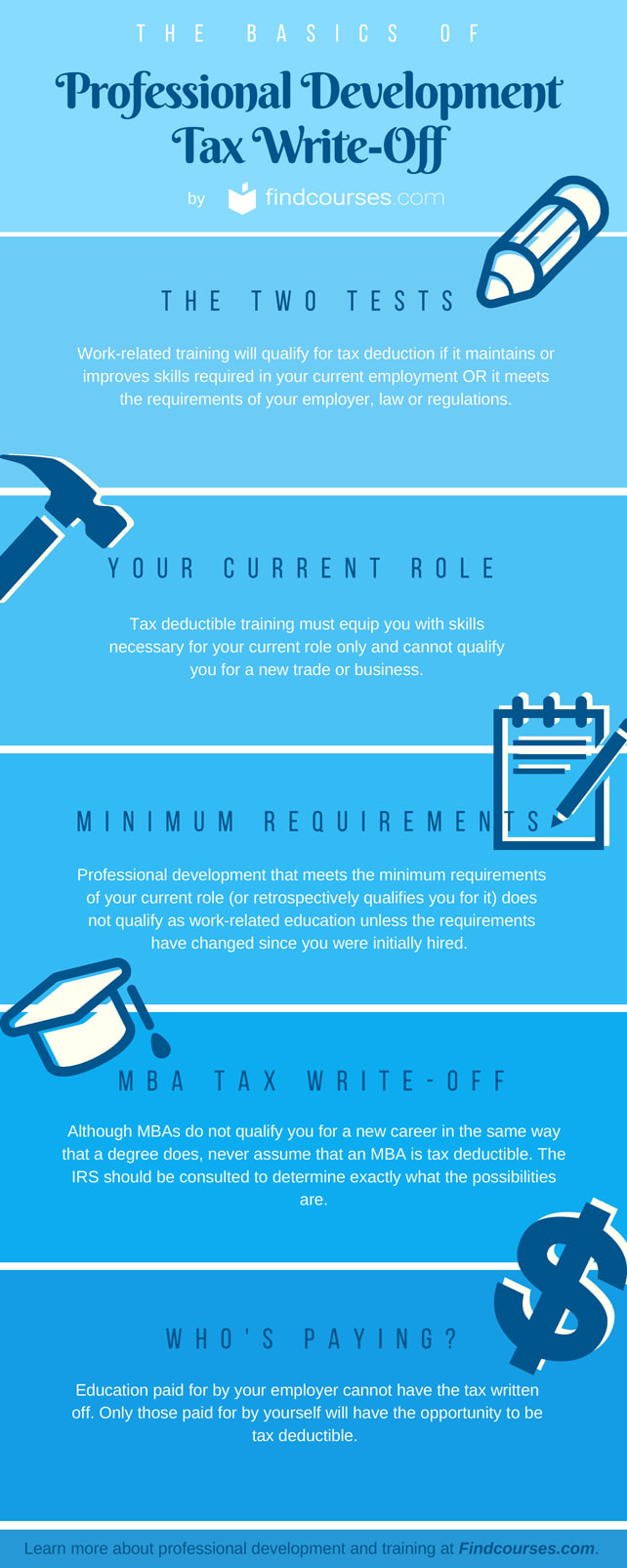Learning doesn’t end once you land the job. Now more than ever it's critical for professionals to stay current in an ever-changing landscape of competition and industries. That’s where professional training courses come in to play.
The IRS recognizes this fundamental truth. Did you know that you can (in some cases) take a tax write-off for work-related professional development? Expenses that you can deduct include: course fees and tuition, books, supplies, lab fees, and similar items.
In this article, we try to outline for you some of the basics regarding tax deductibility and professional development:

As an employee, you can claim your work-related training as a miscellaneous, itemized deduction, thereby reducing the amount your income is subjected to taxation. If you're a self-employed, sole proprietor, you can write off the business expense directly from your income.
The Two Tests: How to Determine if Your Professional-Development Course is Tax Deductible
Work-related professional development qualifies as a tax deduction if it passes one of these two tests:
(1) "Maintains or Improves"
The education equips you with skills directly applicable to your current role. The standard here is that it "maintains or improves" skills required in your current employment, business or area of trade but does not qualify you for other roles or careers.
(2) "Required" by your employer or law
The education meets the requirements to maintain working licenses. In other words the "requirements of your employer, applicable law or regulations."
Training is Deductible for Your Current Role Only
As mentioned above, tax deductible professional development training must equip you with skills necessary for your current role only. It cannot qualify you for a new job.
For instance, if you take a course to close deals faster and you're already working in Sales, that course would be tax deductible. A quick search through findcourses.com connects you to a wide range of sales courses offered by top providers to help you enhance your skills.
Training that qualifies you for a new career-- regardless of your intention-- is not tax deductible. This criterion is tricky, but the burden of proof is on you. If you want to take the deduction, it’s up to you to show how the training is directly related to your current job.
Meeting the minimum requirements of your job
Professional development that would qualify you for the minimum requirements of your current role does not qualify as work-related education. That is, unless the requirements of your job changed since you were initially hired. If the requirements are the same, then it's assumed that you were qualified when hired.
Find your next course
Is Coaching Tax Deductible?
Your career or executive coaching investment may be tax deductible. (That’s an emphatic may, so be sure to discuss your specific situation with a tax professional.)
It's clear you can deduct work-related education to "maintain or improve" your skills in your present job, career, or profession. But you're generally out of luck if the expense trains or qualifies you for something new. Based on this subtle distinction, executive coaching seems most likely to be a work-related deductible expense, but career coaching may not qualify as such. Keep in mind, this diagnosis is made on a case by case basis. It’s up to you to substantiate a direct relationship between your current employment and the coaching expense. Best discuss your specific situation with a tax professional if you have any doubts.
Find your next course
Are MBAs Tax Deductible?
Everyone's situation is different, but it seems that MBA expenses may be deductible for many MBA students. Never assume it is tax deductible, though. Some students’ pre-MBA experience may disqualify them. Also for those studying at well-recognized institutions, your case may be easier made.
Your individual scenario will be judged on the MBA course curriculum, the admissions criteria, and the type of work you were doing before and after the MBA. You are eligible for the deduction if you can meet these criteria:
- You're already established in a business profession.
- The training does not prepare you for a new job.
- The courses must enhance the skills you had pre-MBA.
- You must continue to use the same skills after completing the MBA.
Find your next course
Who's Paying Determines Deductibility
Who pays for the education will also be a factor in determining whether or not it is tax deductible. Education paid for by your employer cannot be taken as a write-off. Only self-paid education expenses are potentially tax deductible.
Your employer can pay up to $5,250 per year for you in professional development without it counting as income. This opportunity, however, must be formally offered to all employees.
Need More Help Determining if your Professional Development Expense is Deductible?
The IRS has a simple, interactive online test to help you determine if your work-related training is tax deductible. There's also a page dedicated to the newer rules and regulations around Work-Related Education Expenses.

